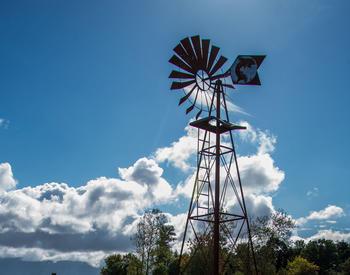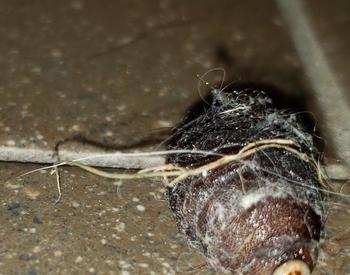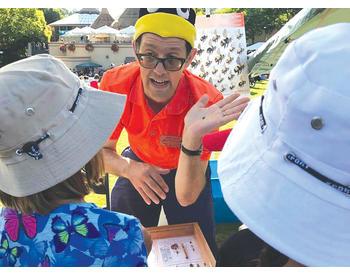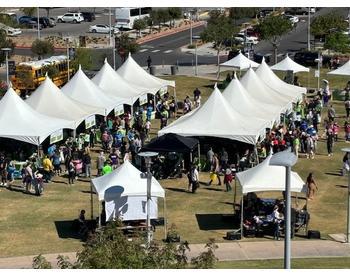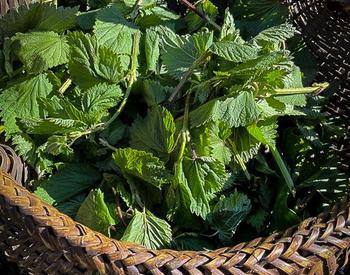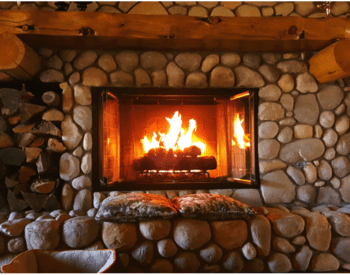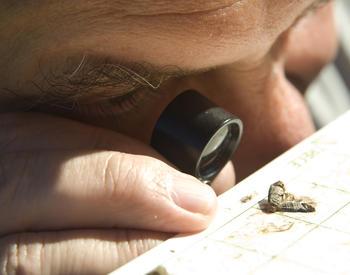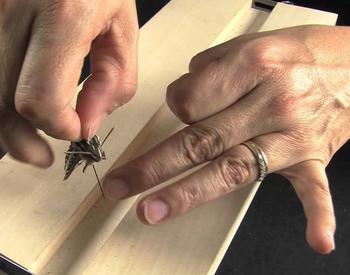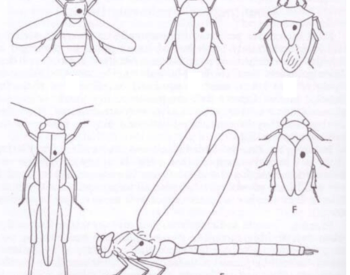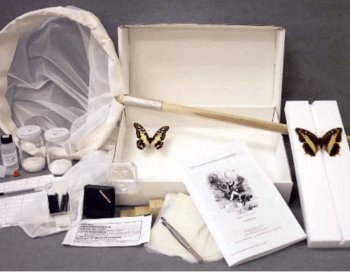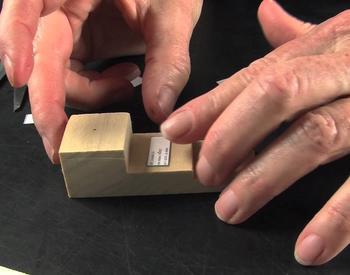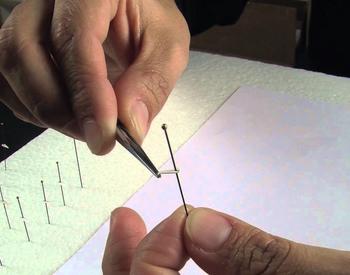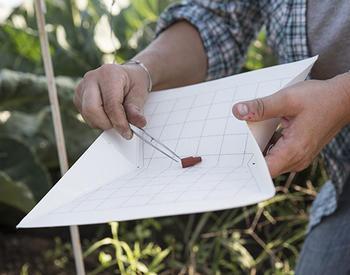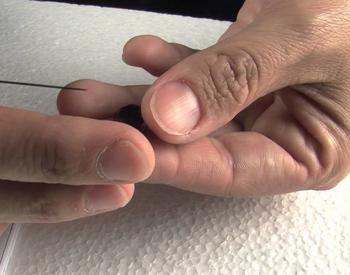Transcript
00:00:02 Rick
Hello everyone. This episode is entitled What's the Buzz in school gardens? Where Michelle and I interview Andony Melanthopoulos, an associate professor at Oregon State University and one of the world's most foremost authorities on pollinators. This is part one of a two-part series. So let's buzz on over to the studio and see what's going on.
00:00:38 Michelle
Welcome to the farm to school podcast where you will hear stories of how youth thrive and farmers prosper when we learn how to grow, cook, and eat delicious, nutritious local foods and schools across the country, and the world.
00:00:49 Rick
We're your hosts. I'm Rick Sherman
00:00:51 Michelle
and I'm Michelle Markesteyn. We are so fortunate to have one of the world's foremost experts on pollination and bees in our backyard. Literally, please welcome to the program, Andony Melanthopoulos.
00:01:06 Andony Melanthopoulos
Hey. Hey.
00:01:08 Rick
Hey, how are you doing? (applause sound effect) I have been dying to use one of these special buttons on my little podcast device, so thank you for that, indulging me.
00:01:23 Andony Melanthopoulos
Your backyard has so many people in it.
00:01:26 Rick
Yeah, We bring in a crowd.
00:01:29 Michelle
And chickens? He has a lot of chickens in his backyard.
00:01:31 Rick
We're at my house, everybody, just so you know, in in my studio kitchen as it were. So, Andony you have to excuse me, I have a really good friend that I coached for years named Antony and you’re “Andony” and it messes up my brain all the time so…
00:01:49 Andony Melanthopoulos
It's the perpetual question is what is my name? And I, my girlfriend and my mother say it differently. So you guys are good.
00:01:52 Rick
Yeah. Well, Michelle says her name differently every time. She says. She says MarkeSTEIN and MarkeSTIN. It depends what she...
00:02:03 Andony Melanthopoulos
I can't hear the difference like in my ears.
00:02:06 Rick
That's another podcast. Yeah. So everybody, I just found out something neat. One of our podcasts, we explored my humble beginnings in the farm to school world. And I was a runner for Western Washington University. I just found out that Andony ran for our very much...
00:02:07 Michelle
Interesting.
00:02:26 Rick
How do I say it? It was our rivals.
00:02:29 Andony Melanthopoulos
Hated.
00:02:36 Rick
Well, you said hated, but he ran for Simon Fraser University in in BC, Canada. And so he is a proud, proud Canadian, which I applaud and I love that, but I'm not too happy that he went to our rival school and he ran cross country and track for them as well. And I did not know that.
00:02:36 Michelle
Wow.
00:02:48 Andony Melanthopoulos
Yeah. Was it? It was a rough start to this podcast and we discovered.
00:02:51 Michelle
That we almost canceled it. We almost cancelled the entire podcast.
00:02:54 Rick
Yeah. So and then he tell us a little bit, how did you like, how did I know how I started from humble beginnings as a runner? And I morphed into this job. How did you start from back then in British Columbia. And how did you know that you wanted to get into bees and pollination and all that? And how did you end up here where you are now?
00:03:19 Andony Melanthopoulos
You know I love bees and I've loved them for decades, but I didn't start out that way. The thing I love about bees is that they're deeply tied to agriculture, but I'm a city kid. I have, you know, I grew up playing video games and listening to, you know, music and stuff. But when I went to Simon Fraser University, I remember biking every day up that Long Hill and I would see this thing there. I thought, oh geez, I know what that is, and I then there was this bee biology course. It was the last one ever taught honeybee biology. And the professors first question was, has anybody seen a beehive? And I said, of course, I've seen this a thing said no, that's a weather. Those are my humble beginnings. I had no idea what I was getting into, but it has drawn me into so many directions, and particularly when it comes to apiculture, the study of honey bees.
00:04:10 Andony Melanthopoulos
It has connected with all of these beekeepers. There are beekeepers in every country and you can drop in and you have this common language of these insects that everybody keeps to for producing honey. But also, you know, it's this huge has this huge role in agriculture in terms of pollinating.
00:04:32 Rick
Well, I want to be fair here. Like when you say there's people that are beekeepers and there are people that are interested in bees, that's one thing. But Andony, like Michelle introduced in the beginning of our podcast. He's one of the world's foremost leaders in the subject and he has a lab over at Oregon State University in Corvallis, OR. And we were actually fortunate to go there and it's about the size of my kitchen. It's a small little place, but yeah, you're an associate professor. Is that correct? That's correct.
00:05:10 Andony Melanthopoulos
Right, yeah.
00:05:14 Rick
And so when we were there, how many bees do you have cataloged there? And when I say cataloged, just to be a little graphic here, it's like you see a critter that has a pin through them on a on a board and they're identified as a certain genus species name and everything. But there was a few there. How many, how many would you guess that you had there on hand?
00:05:36 Andony Melanthopoulos
I would say rough estimate 200,000 bees, each one meticulously prepared by volunteers in the state of Oregon. Yeah, and they had little tag under them, just like the old library with the Dewey Decimal cards.
00:05:50 Rick
Yes.
00:05:50 Andony Melanthopoulos
And they each told you where in the state of Oregon they were collected, each one.
00:05:56 Rick
So that was my follow up question. How many bees, how many different varieties of bees are there in in Oregon in our state?
00:06:06 Andony Melanthopoulos
When I first got here, we had this bold statement. We said 500 species and then we had to keep revising it upwards because it turns out there's more and more.
00:06:16 Rick
Yeah.
00:06:17 Andony Melanthopoulos
We have a taxonomist at Oregon State University, Lincoln Best, who has done the sort of piercing together all the pieces of the puzzle, things that we should have but don't have his number is 720.
00:06:31 Michelle
That's a different species.
00:06:31 Rick
And you find more every day.
00:06:33 Andony Melanthopoulos
Different species in the state of Oregon.
00:06:36 Rick
You told us.. you showed us. There was one guy and most of them looked like flies to me. That you know what I would think looked like a flies or... Yeah. And then there's the bumblebee and all that, you know, the and the wasp and Yellow jackets and all. I'm using the…
00:06:42 Michelle
Or ants flying ants.
00:06:51 Rick
..terms that I know of, but you said for instance there was one bee that only lived on one hill in Eastern Oregon and because there was one flower there. Could you tell us about that?
00:07:05 Andony Melanthopoulos
There are all sorts of “one bee” lives in this little place in Oregon, like Oregon is a wonderful, you know, we have everywhere from the coast to Mel here. Think of all the different landscapes. Yeah, the, you know, we have the high desert, we've got the mountains like the Steens and the Wallowas.
00:07:08 Michelle
Wow. Wow.
00:07:23 Andony Melanthopoulos
You go to the Southern Oregon. It's we have everything. So each one of these nooks and crannies has a lot of bees that are common to all of them. But there are these specialists that have evolved over time in these little nooks and crannies. And that means you find this level of like you find them once in a decade. You know, people don't see them very often.
00:07:48 Michelle
Well, and that's what you were saying, that it relies on volunteers. Can you tell us more about the citizen scientists you work with?
00:07:54 Andony Melanthopoulos
They are amazing. These people that just humble me. I developed a program. I knew that to be able to find all these bees, these rare bees and these nooks and crannies, you either needed to have this huge, you know, Agency or you needed to find people who were passionate about it, and there turns out to be a lot of people are passionate about bees. And so we give them the basic training and then they go out and to their hearts content. They it's like a treasure hunt. They go looking for all of these odd bees. And when we started it we thought.
00:08:31 Andony Melanthopoulos
Well, we'll just started as a small thing, but it grew and it's become this program like the Master Gardeners, it's called and it's hilarious. The name is hilarious. It's called the “Master melattologist”. And I thought like when we started it off, we'd call it something simple like oh, it's the bee enthusiasts. And they rebelled. They said no, we're really serious people. We're doing also the serious work. So call us what we are and said, OK, master melattologist.
00:08:44 Michelle
That's a mouthful.
00:08:58 Rick
That because your name is Melanthopoulos?
00:09:01 Michelle
Well, you get that all the time.
00:09:03 Andony Melanthopoulos
It's funny cuz the last name, no. This is the hilarious thing. My last name literally means honeypot. I just like you know, I was like.
00:09:10 Rick
Ohh.
00:09:11 Michelle
You were made for that!
00:09:12 Rick
I know what to call you from now on.
00:09:13 Michelle
No, we're not. No.
00:09:15 Rick
No, we're not going to do that.
00:09:24 Michelle
OK, so one other thing. We kind of glazed over. That was eye opening to me. Is you mentioned agriculture and most people, when they think of bees, they think of honey, but in the economics of it all, honey is really a byproduct that what is huge for Oregon agriculture in the.. I don't know where we're at.. Like 2-3 hundred million in in economic impact for our state is pollination services. And like, what does that look like for people like what actually is that?
00:09:45 Andony Melanthopoulos
It was fun, you know, driving down here. I was just counting bee colonies along the highway. You know, the Meadow foam is now in bloom. That's all. Those oil seeds need to be pollinated by bees. Yesterday it was in a valenza Cloverfield. It's an annual Clover. And it had to be pollinated by bees to make the seed. We just finished blueberry pollination in the state, it's a large pollination to get that those big juicy berries. You're going to need bees all the way out if you go to Hermiston that Hermiston melons. Best melons on the planet. I have to say, like the cantaloupes and the watermelons from Hermiston.
00:10:20 Michelle
I have to agree with that.
00:10:21 Andony Melanthopoulos
They are delicious. You need bees to pollinate it.
00:10:24 Michelle
And even Oregon bees go all over. Don't they travel?
00:10:27 Andony Melanthopoulos
That's The funny thing. So you've seen these documentaries where the bees go into California and they're shipped all across the nation. Think about Oregon. Our bees leave the state briefly in February to go down to California to pollinate this massive almond crop, but then they stay in the state. It's really unique in the in the US, they don't travel everywhere. They come back into the state and there's so many pollination contracts they had contracted, paid by the farmer to pollinate it that they just kind of.
00:10:56 Andony Melanthopoulos
Bounce back and forth in the Willamette Valley, maybe over into Madras and maybe over into Eastern Oregon, but they stay in the state. This is really unique.
00:11:05 Rick
And so about all that pollination stuff, we keep hearing the term colony collapse. Is that a real thing? Are bees on the decline? Should we be freaking out? Tell us more about that.
00:11:19 Andony Melanthopoulos
Yeah. No, it's the term colony collapse disorder came from like, 2006. If everybody remembers this, bees were not on. I was a lonely bee researcher. Nobody talked to me. They'd say I'd say I'd study Bees. They say I was stung as a child.
00:11:35 Michelle
Ohh No.
00:11:39 Andony Melanthopoulos
Yeah. That was the pre 2006 worlds.
00:11:40 Rick
Wow.
00:11:41 Michelle
So you made-up that term to get more.
00:11:47 Andony Melanthopoulos
No, that would have been very mischievous, but.
00:11:49 Rick
We're your. We're your friend, Andony.
00:11:53 Andony Melanthopoulos
Thanks! It happened differently than what happened was there was these bee colonies which suddenly lost all their population of bees about this time of year and they were left with immature bees, but no adults and this was called colony collapse disorder. It turned out to be episodic and didn't return, but that stuck in the media because collapse. You know, the colonies collapsing. There's still problems with bees. That particular symptom that people latched onto back then doesn't appear now. But honeybee colonies are still experiencing , you know more than average losses. The good news is that the beekeepers are ingenious. They're very creative and they make up those losses every year. So our overall supply is steady, but it costs a lot more money for them to be able to do that.
00:13:00 Rick
Well, I think you answered my next question, which is why should we care about bees and so that that that's really important. And they're also, I've heard the term kicked around like bees account for the majority of all pollination. There's other things that pollinate, but bees do most of it. Do you know, like how much do they pollinate? What percent?
00:13:09 Andony Melanthopoulos
Well, let's make it very concrete and for Oregon. So when you think about all the tree fruits, so the we don't have a lot of apples here. We have a little bit at Milton Freewater. But we've got pears and cherries and some stone fruit. That's, well, not hazelnuts. So so hazelnuts are wind pollinated OK.
00:13:34 Rick
I did not know that.
00:13:35 Andony Melanthopoulos
It's weird because you gotta kind of go through the crops and think about what like almonds is a nut that is pollinated, but Hazelnuts and walnuts are nuts that aren’t insect pollinated. So it's this little kind of sifting through. But in Oregon, I would say are tree fruits are berries which include right now, blooming our amazing Marionberry.
00:13:58 Rick
Strawberries. Yeah, blackberries.
00:14:01 Andony Melanthopoulos
But also cranberries, our coastal cranberries that we have here in Oregon, I would say to all your listeners, even those in Washington and other states, the best cranberries on the planet are South Coast cranberries. They are they're sweeter, they're bigger, redder, jucier...
00:14:13 Michelle
They actually are.
00:14:17 Rick
Michelle and I, through her old job at Department of AG, had this Oregon cranberry chutney recipe. I'll drop. I'll drop the recipe in the show. So good.
00:14:25 Andony Melanthopoulos
Ohh it's so good!
00:14:27 Rick
.. but it's all Oregon. Oregon Pears, cranberries and Oregon hazelnuts, and sorry for you listeners that there's far more of you listeners outside of Oregon, and sometimes we brag about what we have, but it's the best thing ever. So I'll put a link to the show notes in there.
00:14:43 Andony Melanthopoulos
You grow those of you in the Midwest, grow up much finer soybean, true.
00:14:47 Rick
True. Yeah, we really don't do here…
00:14:53 Rick
Hi again everybody. As I mentioned at the start of the show, click on the next link to listen to Part 2 of this conversation with Andoni, we'd like to thank you so much for listening today.
00:15:04 Rick
Farm to School was written, directed and produced by Rick Sherman and Michelle Markesteyn, and was made possible by a grant by the United States Department of Agriculture. The content and ideas of the farm to school podcast does not necessarily reflect the opinions of Oregon State University, Oregon Department of Education, and the United States Department of Agriculture. The USDA, Oregon Department of Education and Oregon State University are equal opportunity providers and employers.
00:15:33 Rick
Do you want to learn more about Farm to school? Check out other episodes, show notes, contact information and much more by Googling Farm to school podcast, OSU. We'd love to hear from you. Stop by the website to say hello or give us an idea for a future podcast.
00:15:52 Rick
And I'll see you next time. Bye!.
Join us as for a fascinating interview with one of the world’s foremost authorities on bees and pollination - Andony Melanthopoulos with Oregon State University. We're talking about how bees fit into the world of school gardens! This is part one of a two-part series.
The Farm to School Podcast is produced by Rick Sherman, Farm to Child Nutrition Program Manager at the Oregon Department of Education and Michelle Markesteyn, Farm to School Specialist at Oregon State University Extension with production support from LeAnn Locher, OSU Extension. The show is made possible by a grant from the United States Department of Agriculture.
Want to connect? We’d love to hear from you!
Show notes
- Andony Melathopoulos - OSU College of Ag.
- Andony Melathopoulos - OSU Extension
- OSU Master Melittologist Program
- Oregon Bee Atlas
- PolliNation(podcast): how I got into bees
- Honey Bee Coalition
- Google Scholar: all the work he's done!
- Andony’s Curriculum Vitae
- Master Melittologist Program
- Food Hero
- Food Hero Bee Book & bee videos
- Enhancing Urban Landscape for Pollinators
- OR Bee License plate
Oregon Cranberry Chutney Recipe
Looking for a new family favorite? Here it is! Chutney made with cranberries, pears and hazelnuts. It's incredibly delicious alongside meats, topping oatmeal, spread on a sandwich, or served with cheese and crackers.
Ingredients
- 3 cups fresh or frozen Oregon cranberries (1 - 12 oz package)
- 3/4 cup water
- 1 3/4 cup sugar
- 1/2 tsp cinnamon
- 1/2 tsp ground ginger
- 4 cloves (or 1/8 tsp ground cloves)
- 3 firm Bose or Anjou Oregon pears, cut into 1/4-inch dice
- 3/4 cup golden raisins
- 1/2 cup coarsely chopped toasted Oregon hazelnuts
Directions
- Put water and cranberries into a 6-quart saucepan. Turn on medium high.
- Combine sugar, ground ginger, cinnamon, and cloves.
- Add sugar mixture to the cranberries and bring to a boil over medium high heat.
- Continue to cool on medium for about 10:-12 minutes until cranberries pop and mixture thickens up. Stir often.
- Add pears, and raisins. Turn heat down to a simmer. Continue to simmer for about 10- 12 minutes until pears softened . Stir often.
- Take off heat. Add roasted hazelnuts. (see note below on how to roast hazelnuts)
- Discard the cloves if you can find them.
- Serve chutney hot, or let cool and store for later. Refrigerate in tightly sealed jars for up to three weeks. Goes great with pork, poultry and beef, and as a spread with a variety of cheeses.
To roast hazelnuts:
Place the nuts on a rimmed baking sheet in a preheated oven (at 275 degrees) and cook until lightly browned. About 8-10 minutes. If the hazelnuts have skins, you can remove the skins when they are cool enough to handle, lay them on a clean kitchen towel, or between several sheets of paper towels and rub to remove most of the skins (they never completely come off).
Yield: Makes about 2 quarts
Reposted with permission from the Oregon Department of Agriculture.
